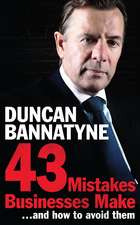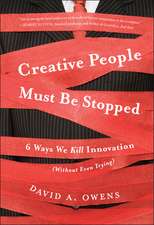New Organizational Forms, Controls, and Institutions: Understanding the Tensions in ‘Post-Bureaucratic' Organizations
Autor Maria Carmela Annosi, Federica Brunettaen Limba Engleză Hardback – 28 aug 2017
| Toate formatele și edițiile | Preț | Express |
|---|---|---|
| Paperback (1) | 789.03 lei 38-44 zile | |
| Springer International Publishing – 3 aug 2018 | 789.03 lei 38-44 zile | |
| Hardback (1) | 890.23 lei 6-8 săpt. | |
| Springer International Publishing – 28 aug 2017 | 890.23 lei 6-8 săpt. |
Preț: 890.23 lei
Preț vechi: 1085.65 lei
-18% Nou
Puncte Express: 1335
Preț estimativ în valută:
170.36€ • 176.78$ • 142.40£
170.36€ • 176.78$ • 142.40£
Carte tipărită la comandă
Livrare economică 18 martie-01 aprilie
Preluare comenzi: 021 569.72.76
Specificații
ISBN-13: 9783319547497
ISBN-10: 3319547496
Pagini: 211
Ilustrații: XI, 212 p. 5 illus.
Dimensiuni: 148 x 210 x 20 mm
Greutate: 0.42 kg
Ediția:1st ed. 2017
Editura: Springer International Publishing
Colecția Palgrave Macmillan
Locul publicării:Cham, Switzerland
ISBN-10: 3319547496
Pagini: 211
Ilustrații: XI, 212 p. 5 illus.
Dimensiuni: 148 x 210 x 20 mm
Greutate: 0.42 kg
Ediția:1st ed. 2017
Editura: Springer International Publishing
Colecția Palgrave Macmillan
Locul publicării:Cham, Switzerland
Cuprins
1. Introduction.- 2. Institutions and Organizations: The Role of Institutional Actors.- 3. External Institutional Pressures.- 4. New Organizational Forms.- 5. Institutions and the Role of Organizational Controls.- 6. Linking Organizational Control and Organizational Learning: Theory.- 7. Linking Organizational Control and Organizational Learning: Research Approach and Methodology.- 8. Linking Organizational Controls and Organizational Learning: Evidences.- Chapter 9. Managerial Challenges, Avenues for Research and Conclusions.
Notă biografică
Maria Carmela Annosi is Assistant Professor at the Management Studies Group of the School of Social Sciences at Wageningen University, The Netherlands. She received her PhD at KTH Royal Institute of Technology, Sweden, and has been a Visiting Scholar at Rotterdam School of Management, Erasmus University, Netherlands. Fellow in Management at LUISS Guido Carli University, Italy, her research interests include knowledge and innovation management.
Federica Brunetta is Assistant Professor at the Department of Business and Management, LUISS Guido Carli University, Italy. She received a PhD from the Catholic University of Sacred Heart, Italy, and has been a Visiting Scholar at the University of Michigan’s Ross School of Business, USA. Her research interests include strategy and management of innovation.
Textul de pe ultima copertă
This book highlights the growing number of ‘post-bureaucratic’ firms that are abandoning hierarchical organizational forms in favor of self-managing teams. Addressing the need to outperform, these new organization types foresee the benefits of an organic structure with new and more indirect forms of control, and aim to coordinate the activities of highly-skilled workers without relying on a bureaucratic superstructure. The chapters explore the tensions that exist between external and internal institutional forces. As new forms of control strategies emerge, mostly value-based, this book accounts for the cognitive categories, conventions, rules and logic that should be integrated and combined with traditional forms of managerial controls in order to enable co-existence with established bureaucratic frameworks. This book will be of interest to academics in the fields of organizational behavior and innovation management, and also practitioners and managers aiming to shift from a traditional hierarchical structure to post-bureaucratic forms.
Caracteristici
Focuses on a multi-level setting, accounting for cognitive categories, conventions, expectations, rules, routines and logics. Takes a relevant and modern approach enabling readers to understand issues from a managerial and strategic standpoint. Presents an analysis of strengths and critical issues of new forms of organizations.
















